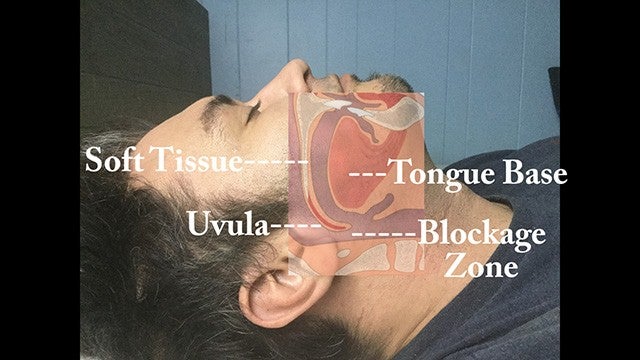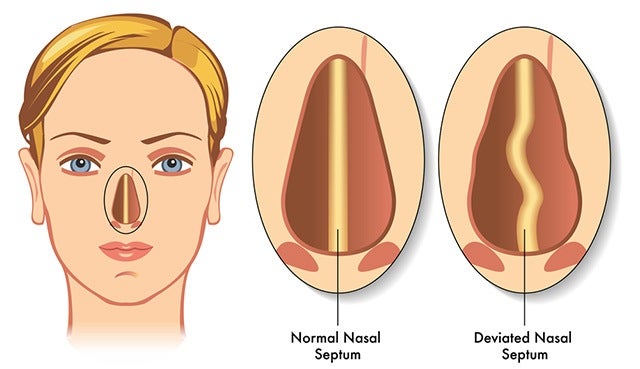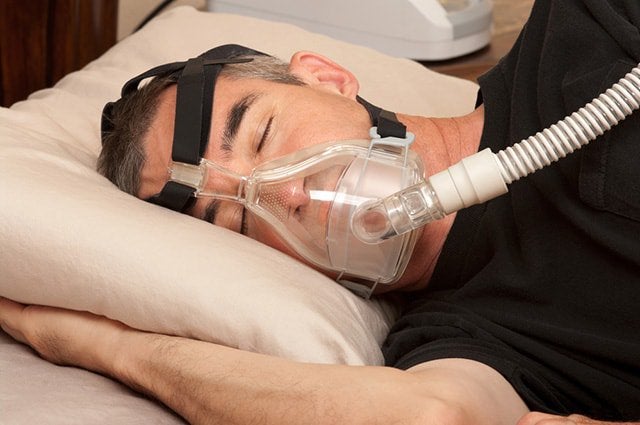For those with chronic snoring issues – or those who have partners with a disturbing snore – the situation sometimes seems hopeless. Snoring can be very disruptive to everyone’s sleep, and it can really take a toll in several areas of your life. While everyone may snore lightly from time to time, understanding the underlying causes of snoring and what is plaguing you, as well as how serious your condition may be, can help you better get a handle on how to stop snoring.

What exactly is snoring and what causes it? What symptoms should you look for if you’re trying to determine whether or not snoring has become dangerous for you or harmful to your physical, mental, and emotional health? Let’s break down everything from start to finish, including what snoring is, how it can be troublesome, when to consult a physician, and what you can do to help control, lessen, and even stop snoring.
What is Snoring?
Everyone knows what snoring sounds like but may not understand the bad dynamics of it. The harsh, fast, vibrating sound is caused by too much air trying to be forced through an airway that is too narrow. More specifically, when air flows in through your nose and mouth, it has to pass by several areas of soft tissue to get to your lungs, including the soft palate (the back of the roof of your mouth), the uvula (which hangs at the back of your throat), and the side walls of your throat. When you’re awake, your muscles stay tense and hold these tissues in place forever.
However, when you sleep, these muscles instantly relax, and the tissues soften. This narrows the airway, and the intake of air passing by the soft tissues could produce enough pressure trying to get through the opening that it causes these tissues to vibrate. The vibration, as well as things like the thickening of the tongue and the uvula rattling against the back of your throat, cause the sound of snoring. The more tissue, and the narrower the passage, the louder the snoring can be.
Symptoms of Chronic Snoring
Not everyone has regular issues with snoring and only experience it on occasion. However, those who snore often will find they have very specific symptoms related to the problem and require treatment. Likely, if you’re a person who is heavy snorer, you’ll notice one or more of the following symptoms:





Additional symptoms, including difficulty concentrating during the day or a witness account that you’ve stopped breathing during sleep, or even gasping and choking during the night, are symptoms of a more serious condition called obstructive sleep apnea, and this should be diagnosed and treated in with a cure.
Sleep Apnea
Obstructive sleep apnea, or OSA, causes severe snoring due to the passageway for air being severely constricted in some way. At several points during sleep, that airway actually becomes blocked, leading to inability to breathe or significantly reduced breathing. At this point, the snoring silences, and then you often wake with a snort and will start gasping for air. This typically happens multiple times a night. Results can be mild, like headaches in the morning, or can be more serious, including high blood pressure, chest pain, and a greater risk of heart attack and stroke. Especially those who have heart problems or who are pregnant.
While sleep apnea is not the only cause for snoring, it is a great cause for concern and should be addressed immediately.
Anatomical Causes of Snoring
There are plenty of other things that can cause snoring as well, and these are more common. Perhaps the biggest concern is the way your mouth, nose, and throat are configured. Any extra soft tissue in the soft palate or throat could lead to narrower airways in general and greater obstruction during sleep, when the muscles are relaxed and allow that tissue to drop. In addition, a long uvula can be a factor in snoring, as with the epiglottis (the part of the throat that keeps food and drink from going into your lungs).
Being overweight can severely increase the likelihood of snoring and attribute to OSA. Being obese causes additional tissue to form in the areas that obstruct the airways, which can lead to complete blockage of the passage during sleep. Weight is a big risk factor for snoring and OSA, as well as other health conditions that are already more common in those with chronic snoring problems.
Other problems occur on the nose. For example, if you have a deviated septum, this could greatly reduce the size of the air passages through your nose, making breathing more difficult in general and snoring far more likely. Aging and lack of fitness may also contribute to the weakened muscles and increased snoring.
Pregnancy could induce a temporary problem with snoring, based on the additional tissue growth in the soft palate and throat. Tonsils and adenoids may also be culprits. However, interestingly enough, heredity does come into play. If your parents had issues with snoring based on anatomy, you’re far more likely to suffer the same way.
External Causes of Snoring
Drinking alcohol and smoking are some of the biggest contributors to snoring. Drinking alcohol before bed causes a greater relaxation in the muscles that keep your airways open, and that can cause snoring to worsen or take place in those who don’t usually snore. Likewise, prolonged smoking can permanently loosen these muscles a bit so that there is greater reduction in control while sleeping.
Allergies and illness can cause blockage in the nose, making breathing more difficult. With the impossibility of drawing air through your nose, you have to work harder to pull oxygen in through your mouth. This rush of air is more likely to cause the vibration of the anatomical parts that make the snoring sound, which will in turn cause some swelling and decrease the size of the air passage and cause a cycle of worsening snoring.
Various medications can also affect your ability to sleep without snoring. Muscle relaxants and antihistamines are among the major medications that can induce snoring in patients, as both are depressants to the muscular and nervous system.
Your sleep position may also be to blame for chronic snoring. People who sleep on their back are far more likely to experience louder and more aggressive snoring, simply because gravity is pulling tissue from the roof of the mouth as well as the uvula toward the back of the throat. It’s also been found that sleeping on your back leads to greater relaxation of the muscles in your mouth and the back of your throat, which contributes to the snoring problem.
Who is at Risk?
Anyone can have problems with snoring since there are multiple causes for it. However, as with all conditions and especially those that affect your sleep, some are more prone to experience difficulties related to chronic snoring and especially OSA. Some of the major risk factors include:
Being a man
men have narrower airways than women and are more likely to develop snoring problems, especially sleep apnea.
Having allergies or asthma
because there are already issues with the airways and blockage, you are more likely to suffer from chronic snoring, especially during spring pollination and other heavy allergen alerts.
Being overweight
even a few extra pounds can put you at a higher risk of experiencing sleep deprivation, and those who are obese are much more apt to have sleep apnea.
Being on certain medications
antidepressants and anything that acts as a sedative can cause or worsen snoring.
Being sleep-deprived
this is a vicious cycle because one leads to the other, but that doesn’t make it any less true that lacking sleep leads to further muscle relaxation and thickening of the obstructive tissues which cause louder and more troublesome snoring.
What About Children?
Unfortunately, because of a growing rate of obesity, more and more children have been diagnosed with OSA in recent years. However, while light snoring is common in kids, especially when they have a cold or allergies, most children don’t have problems with snoring. If your child snores on occasion, consider the meal he or she ate before bed. Check if they had a stuffy nose or cough prior to bedtime and if the air in the room is too dry. These may all be contributing to your child’s snoring. If it becomes a chronic problem, you might want to consult a doctor about an underlying cause, such as a potentially deviated septum or something that is causing sleep apnea.
Prevention of Snoring
There are several ways you can prepare yourself for a better night’s sleep that is uninterrupted by snoring. First, make sure your nose airways are clear. The tick is to blow your nose and try using saline solution to keep your nose moist and clear. This can help reduce blocked breathing through the nose and additional strain on your throat.
Consider getting a humidifier for your room. If the air is too dry, you’ll experience worsening conditions of snoring since the soft tissue will now be dry and will cause you to snore louder, as well as the soreness associated with it. Also, having moisture in the room causes your body to produce less mucus, which is used to keep your nose from drying out. Without the additional mucus, you won’t be as stuffy.
Take a look at your pillow configuration. You should be propped up enough that you aren’t allowing all the tissue and the uvula to rest against the back of your throat. However, you also don’t want to prop yourself up too far and run the risk of blocking airways by having your head fall forward and constrict them with the bend in your neck.
Avoid heavy foods before bed so that you don’t have any indigestion that could cause swelling or acid reflux. This could affect the epiglottis, as well, which would be detrimental to your ability to breathe. Also, don’t consume alcohol late in the evening if at all. You’ll be more likely to snore louder if you have a nightcap. Likewise, consider getting on the patch or the gum and quit smoking so that your body can work to strengthen the muscles in your throat again.
You might also try some tongue and throat exercises to help tighten the tissues and muscles that block your air passages and cause you to snore. Some examples of exercises to try are:
1. Press the tip of your tongue to the roof of your mouth, and then slide it backward toward your throat. Repeat the process ten times.
2. Use suction power to draw the length of your tongue against the roof of your mouth, and press your tongue tight against it. Count to 10, and repeat three times.
3. Push the tip of your tongue to the back of your bottom from teeth. Then, press the back of your tongue down against the bottom of your mouth. Count to 10, and repeat three times.
4. Sing. Spend a few minutes singing along to one of your favorite songs, as this will help tighten the muscles and tissue in the back of your throat.
Doing these exercises on a daily basis could help you reduce how much you snore, aiding in the ‘fitness’ of the tissues around your air passages.
Natural Ways to Treat Snoring
Aside from preventing snoring, you can also make changes to your lifestyle that will help treat the problem as it occurs. One of the biggest steps you can take is to train yourself to sleep in a different position. Snoring is proven to be worst when you sleep on your back, and changing this can make a world of difference, not just for you but for your sleep partner. This may involve sewing a tennis ball to the back of your pajama shirt. Rolling to your back will cause discomfort, and you’ll roll back over.
Alternatively, try using a body pillow, hugging it so that you have something to hold you on your side. If you must sleep on your back, invest in a no-snore pillow, or you make sure your head is elevated approximately 4 inches since this will help push your tongue and jaw forward, opening up your airways.
Work to stop smoking, drinking alcohol, taking sleeping pills, or using any sedatives. While drinking can temporary render your muscles more lax, smoking can cause long term effects of a similar nature. Sleeping pills and other sedatives actually cause the tissue to soften further and make it extremely difficult to breathe, especially if you already have a narrow air passage. Clearing your system of all of these ‘vices’ can lead to a better night’s sleep, partially because they are all risk factors for snoring and partly because they’ve all been shown to reduce healthy sleep anyway.
Exercise regularly, but not before bed. Science has shown that being active and fit, regardless of weight, can reduce the episodes of heavy snoring. Try simple things like walking, stretching, or yoga. If you are overweight, try to get back to a healthy weight with a healthy diet, and don’t eat large meals before bed. The digestive problems that could occur can lead to more issues with snoring as well.
Consider going to the dentist for help. Your dentist can provide you with a mouth guard that will help keep your airway from being blocked. They look a lot like what athletes use to protect their mouths during their sporting events, and they are configured to move your jaw and tongue forward, as well as to help hold some of the soft tissue in place while your muscles relax. There are a few cheaper options of the DIY variety available as well, if you want to try this before investing in a more expensive device.
You should also strive to get more sleep. Because snoring interrupts your sleep and causes restlessness even while unconscious, you aren’t getting enough rest, which then leads to further snoring issues. Try to go to bed early for a few nights, increasing the amount of time you sleep, and you should see a reduction in how tired you are through the day, leading to a more restful sleep with less snoring involved.
When Home Remedies Don’t Work
If these suggestions don’t at least reduce the occurrence of snoring, you might want to talk to your doctor about being a part of a sleep study. It’s possible your snoring issues are dangerous and may include symptoms of OSA. A sleep study can help identify if this is the underlying problem.
Should further steps need to be taken, there are more intense therapies and procedures to help with snoring. For example, there is a machine that can help push air through to your lungs with a slight bit of pressure that reduces snoring and treats sleep apnea. The continuous positive airway pressure, or CPAP, machine offers options that include using a pillow, mouthpieces, nasal mask, or full face mask for this infusion of air.
You may want to check out: Best Pillow for Snoring
If you’re simply having issues keeping your mouth closed and could solve snoring issues by breathing only through your nose, there are chin straps that can aid in this situation as well. You can speak with your doctor about getting one of these to try and help you sleep better without snoring.
Surgery is an option, as well. A deviated septum can be corrected, and overly large tonsils or adenoids can be removed to improve passage of air through to the lungs. Other procedures can remove excess tissue in the mouth and throat or shorten the uvula. There are even ways to open things up by implanting devices within the palate to help support it and stiffen the tissues. All of these are more radical options based on the severity of snoring and sleep apnea, but it should be considered if you are suffering and in danger.
You may be interested in: Best Earplugs to Block Out Snoring
The Bottom Line
If you experience snoring, you’re one of millions of people in the world. But if you’re having difficulty sleeping well or find that you’re waking frequently and sometimes with a start, there could be a more serious issue involved. You should speak to your doctor about the possibility of having obstructive sleep apnea and how to treat it.
In other cases, there are plenty of things you can do to help yourself get a better, healthier sleep. Change your lifestyle by adjusting your diet and exercising regularly. Find a healthy weight, and stick to it- this will help you stay fit and reduce the events of snoring. In addition, stop smoking, and don’t consume alcohol or heavy meals too close to bedtime. Consider the medications you take that could act as sedatives and determine if they’re necessary. If not, cut back and stop unneeded medications that could be attributing to the problems with snoring.
Work on changing your sleep habits, as well. Have a regular bedtime so that you get plenty of sleep, and find a way to train yourself to sleep on your side rather than your back. Have a humidifier so that the air in the room doesn’t get too dry. This will help immensely with the occurrence of snoring. You might need a mouth guard to help you keep your airway open as well.
When it comes to your health, sleep is extremely important, and figuring out how to stop snoring is essential to getting a healthy amount of restful sleep. Try to resolve the issue yourself with habit changes, but if that doesn’t work, and it’s starting to affect you so that you’re tired and irritable (and likely, so is your partner because your partner isn’t sleeping well through your snoring), it’s time to take further action. Don’t just brush the issue of snoring aside as a common problem. While it is common, chronic issues aren’t, and loud snoring is detrimental to your health, physically and mentally. Take care of the situation so that you are happier and healthier, and so are others around you.
Do you find the information helpful? Let me know and comment below.






























